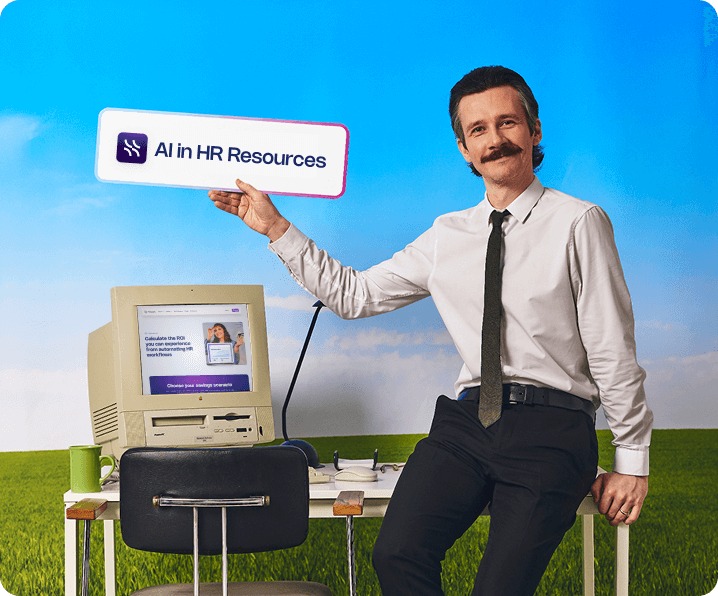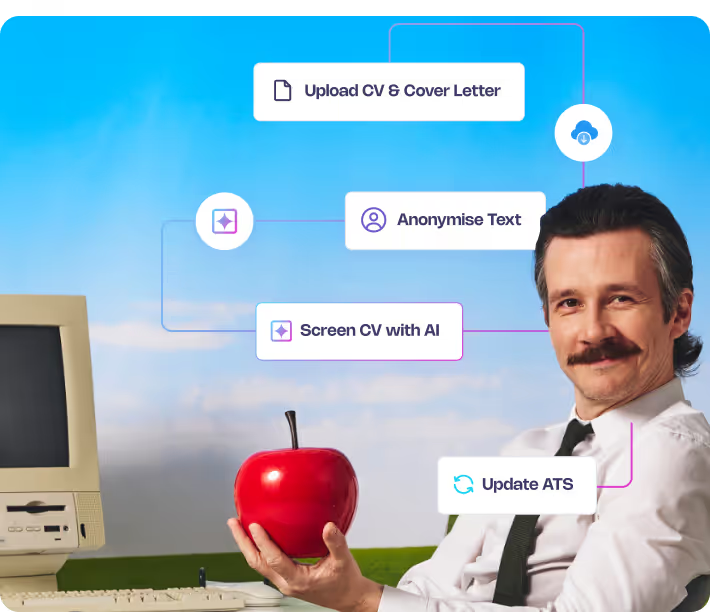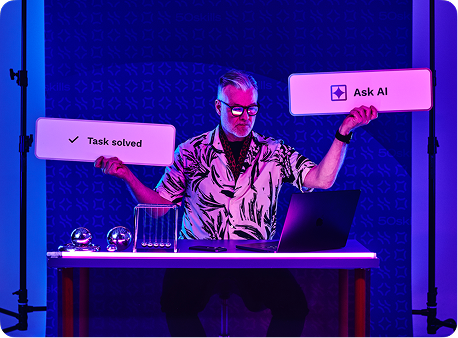Exclusive Q&A on AI's transformative impact on HR from an industry expert
The world of HR, as with every business function, is undergoing a significant transformation, driven by the advent of artificial intelligence (AI). Jeff Wellstead, with over 35 years of experience in the HR sector, has been a pivotal figure in embracing and integrating AI into HR practices. From grappling with vast amounts of data to leveraging AI for strategic decision-making, Jeff has seen it all.
In this enlightening Q&A, Jeff discusses what AI in HR means to him, his journey into the AI-driven HR realm, the latest trends, and the remarkable benefits of integrating AI into HR processes. His insights offer a valuable glimpse into how AI is reshaping HR, making it more strategic and impactful than ever before.
Q: Can you briefly explain what AI in HR means to you?
As an HR practitioner with 35 years of experience, AI is a dream come true – and a technological revolution that I’ve been impatiently waiting for all these years! Traditionally, HR involves managing vast amounts of data—candidate information, employee demographics, performance metrics, and more—often manually through spreadsheets and documents. This process is prone to errors and inefficiencies. AI changes this by enabling us to process and interpret data accurately, uncover patterns, and generate valuable insights. It allows HR professionals to shift from routine data management to strategic, predictive roles, providing powerful commercial insights and enhancing our strategic relevance within organisations. AI in HR feels like emerging from a dark cave into the light, offering new tools and capabilities to lead our companies effectively.
Q. How did you first get involved with AI in the HR sector?
My journey with AI in HR began with fleeting encounters with machine learning and pattern-matching algorithms, which often felt like magic but lacked lasting impact. Early attempts to use data for insights, such as identifying pay disparities, were frequently dismissed due to flawed data comparisons. I envisioned AI tools that could provide clear, actionable insights and strategic recommendations. Over the past two years, AI has matured in HR tech, moving from peripheral features to core functionalities. I've deployed several AI-powered tools, transforming HR from administrative tasks to strategic roles, and hope soon to be dealing with nothing but AI tools as the impact is massive for this function. Importantly, HR gets to shed its administrative help-desk activities and engage with far more powerful and impactful commercial outcomes than ever before.
Q. What are the most significant trends you’re seeing in AI for HR right now?
One of the most significant trends in AI for HR is the rise of highly customisable HR chatbots that can be trained on both internal data and global knowledge, providing an affordable solution for routine tasks.
Tools like 50skills allow you to create workflows across multiple HR tools to ensure smooth, efficient experiences that are nicely organised and seamless to the users.
The most exciting stuff I’m seeing is the creation of skills-based organisations. These organisations use skills and competencies as foundational data to map roles to key skills, behaviours, and outcomes. By comparing validated skills and performance data, they build a dynamic, 3-dimensional picture of each employee's value and capability across the entire organisation. This empowers HR to make strategic decisions, anticipate trends, and provide valuable commercial insights, positioning HR as a pivotal function within organisations.
Q: What are the biggest benefits you’ve observed from integrating AI into HR processes?
In short, massive savings in time, money, effort, useless thinking, prioritising and structuring complicated information and data sets.
AI tools kick-start thinking, provide insights, and organise information, all while you make a cup of tea! So start with delegating all administrative and compliance-oriented HR stuff to a Chatbot that is trained on your company’s policies and free up time to focus on strategic initiatives.
Understanding your company’s most mysterious and unpredictable asset, which also represents 70% - 80% of its balance sheet, is what HR is there to do. It’s a science and math job – not just a touchy-feely, warm and fuzzy party-planning role as the perception often becomes. AI helps predict organisational needs and steer high-level decision-making by analysing data-driven insights, making HR a more powerful and strategic function.
Q. What challenges have you encountered when implementing AI in HR, and how did you overcome them?
Implementing AI in HR presents several challenges:
- Data privacy and security: Protect sensitive data with encryption, access controls, compliance with GDPR, and data anonymisation.
- Bias and fairness: Conduct regular bias audits, use diverse training data, and combine AI with human oversight to ensure fairness.
- Transparency and accountability: Implement explainable AI, maintain thorough documentation, and establish accountability frameworks to foster trust.
- Ethical use and governance: Develop ethical guidelines, form ethics committees, and provide regular training on ethical AI use.
- Job displacement: Invest in reskilling programs, communicate transparently about AI's impact on jobs, and support career transitions.
By addressing these key areas, HR professionals can leverage AI responsibly and ethically, ensuring it enhances rather than disrupts the workforce. Establishing robust governance policies and leveraging AI for routine tasks can transform HR into a strategic function.
Q: How has AI impacted the roles and responsibilities of HR professionals?
It’s going to relieve us from being minions to administrative and compliance hell! It can easily address the challenges and issues we grapple with today, and thus will allow us the space and elevated potential to start unleashing far deeper thinking, strategising, planning and doing than we’ve ever done before.
Recruiters can use AI-powered bots to source and engage candidates, turning them into 'snipers' who find the perfect fit. HR Business Partners can build stronger relationships and address employee issues, using AI as a co-pilot. Compensation and benefits professionals gain three-dimensional insights into pay structures, linking contribution, capability, and compensation for fair and competitive pay.
Imagine every level of HR professional having the ability to up their game by a factor of 100%. What an amazing time to be alive and engaged with this stuff!
Q: In what ways has AI improved employee experience and engagement?
Here are 7 areas where AI tools can positively impact the employee experience, fostering a more personalised and engaging work environment:
- Personalised learning and development: AI curates custom learning paths based on individual strengths, weaknesses, and career goals.
- AI mentorship and coaching: Virtual coaches provide ongoing guidance and support, particularly valuable for remote workers.
- Task automation: Automating repetitive tasks like scheduling and data entry with a tool like Journeys by 50skills frees employees to focus on strategic work.
- Predictive performance analysis: AI predicts potential for future roles, fostering proactive career development.
- Personalised work-life balance support: AI recommends schedule adjustments to optimise work-life balance and reduce stress.
- Real-time feedback and recognition: Immediate feedback and recognition boost morale and motivation.
- Personalised perks and benefits: AI suggests benefits tailored to individual preferences, enhancing overall satisfaction.
Q. What key performance indicators (KPIs) do you track to evaluate the effectiveness of AI in HR?
I apply the same KPIs I do today for the HR function – but just expect there to be a massive uptick in terms of positive outcomes for each including:
Attraction and recruitment
- Time-to-hire: Average time from opening a position to filling it.
- Quality of hire: New hires' performance against expectations.
- Cost-per-hire: Total cost of recruiting and onboarding.
Onboarding and development
- New hire retention rate: Percentage of new hires staying after a set period (e.g., 1 year).
- Time-to-productivity: Time for new hires to reach full performance.
Performance management and compensation
- Employee Net Promoter Score (eNPS): Employee loyalty and referral willingness.
- Pay equity analysis: Addressing gender or race-based pay gaps.
Retention and separation
- Employee turnover rate: Percentage of employees leaving within a given period.
- Exit interview feedback: Insights from departing employees.
Employee relations and wellbeing
- Employee satisfaction survey results: Overall satisfaction with various aspects of work life.
- Work-life balance perception: Employee sense of balance between work and personal life.
Q: What advice would you give to organisations that are just starting to explore AI in HR?
Hurry up! The time to adapt and engage with AI in HR is now. The industry is rapidly evolving, and early adoption will give you a competitive edge. Here’s some advice:
- Educate yourself: Start learning about AI in HR today. Explore articles, attend webinars, and engage in online discussions to stay informed.
- Experiment and iterate: Begin with small AI projects to understand its impact. Use the insights to scale and refine your approach.
- Involve stakeholders: Ensure buy-in from leadership and involve key stakeholders in the AI implementation process.
- Focus on ethics: Develop ethical guidelines and frameworks to govern AI use, ensuring transparency and fairness.
- Utilise resources: Leverage a variety of educational resources.
Here are some useful links to get you started:
Sites and newsletters:
Podcasts:
LinkedIn groups:
Learning:
By staying informed and proactive, your organisation can successfully integrate AI into HR, driving efficiency and innovation.
About Jeff Wellstead
Jeff is a seasoned expert in AI applications within the HR context, boasting 25 years of experience in people strategy design and consulting for high-growth technology businesses. Based in the UK, Jeff has worked with over 16 organisations that expanded globally, with half being acquired by industry giants like Symantec, Oracle, and Microsoft. He specialises in guiding HR functions through the AI-driven paradigm shift, empowering HR technology innovators to create disruptive AI-powered solutions, and simplifying talent management with AI-driven tools. Jeff's deep knowledge spans all elements of human resource management and operational scaling for rapid-growth companies, making him a valuable asset in navigating the evolving HR landscape.



















.png)
.png)





